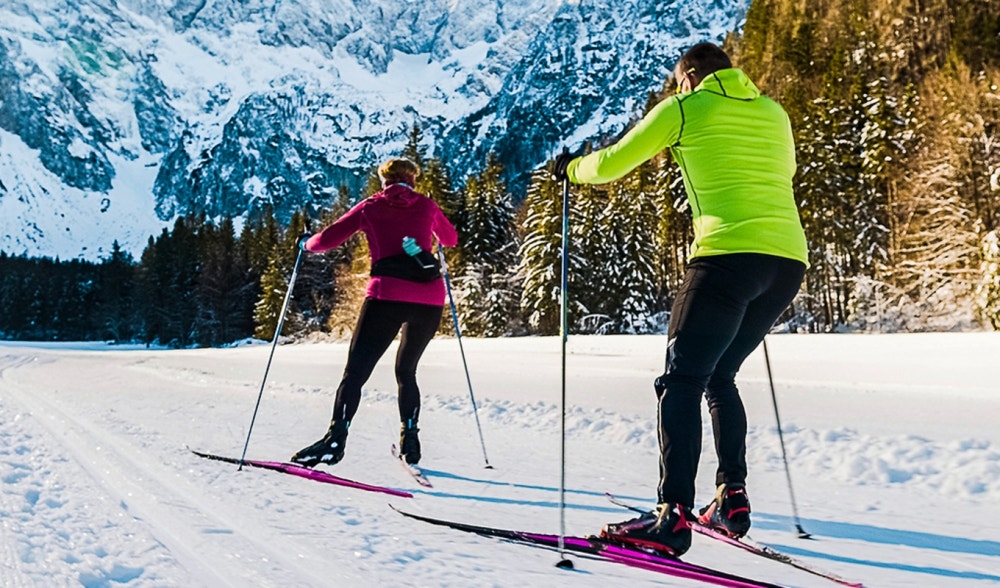With " winter sports " we refer to all those sports that take place on snow and ice, traditionally during the winter period in the Alpine countries, in Northern and Eastern Europe, in Japan, in North and South America. They are normally practiced in conditions of low temperatures and moderate or high altitudes.
 Obviously for these athletes the challenges from a nutritional point of view are represented by being in extreme environments, where energy expenditure, the speed of use of muscle and liver glycogen, iron turnover and fluid loss increase. Nutritional needs vary considerably from one athlete to another, clearly due to different physical and physiological characteristics, environmental and competition conditions and also due to varying energy demands.
Obviously for these athletes the challenges from a nutritional point of view are represented by being in extreme environments, where energy expenditure, the speed of use of muscle and liver glycogen, iron turnover and fluid loss increase. Nutritional needs vary considerably from one athlete to another, clearly due to different physical and physiological characteristics, environmental and competition conditions and also due to varying energy demands.
However, these athletes often have in common the relatively lean physique , periods of high intensity training, high intake of energy and nutrients, specific water needs and targeted nutrition for pre and post competition. Let's try to understand in detail how it is possible to manage Energy and integration for an optimal result in terms of performance.
Specific nutritional needs of winter sports
There are several strategies that these athletes can undertake to promote acclimatization at high altitudes or to improve performance carried out at sea level. Training in adverse weather conditions involves environmental stress and metabolic challenges , which imply an adjustment of the diet. The factors to consider are mainly 2:
- Altitude - increases energy expenditure , metabolic rate and sometimes even appetite suppression . It is therefore essential to make the correct amount of carbohydrates, to maintain good energy levels, body weight and preserve lean mass. At altitude, blood glucose and glycogen are in fact used rapidly as a fuel source; low iron reserves interfere with effective haematological adaptation; a reduction of body water occurs.
- Cold - due to thermoregulation , low temperatures increase energy expenditure and therefore the body's energy expenditure. During physical exercise in cold environments, athletes can lose up to 3-8% of their weight.It is also important to pay attention to hydration, and altitudes above 3500 meters can also affect sleep and immune function.
Knowing therefore the critical issues that this particular type of sportsman has to face, it is possible to establish nutritional plans and guidelines that allow not to risk deficiencies and that at the same time support performance.
Of all winter sports athletes, the cross-country skier certainly records the highest energy expenditure . A study on the calorie consumption of cross-country skiers reported an average expenditure between 3609 and 4838 kcal / day for women and between 6070 and 8341 kcal / day for men. These high consumptions are due to an important muscle mass, and lead to a high intake of food every day: a difficult challenge especially for skiers.
Macronutrients
The management of macronutrients varies according to the winter sport practiced and the environmental conditions: we will specifically try to treat the needs of the cross-country skier, a sport that best combines muscle Energy and aerobic endurance .
Carbohydrates - The limiting factor for a cross-country skier is certainly glycogen : glycogen reserves decrease by 30-40% during a 10-15 km race, until they are almost completely exhausted when the race lasts 50 km. The supply of carbohydrates is therefore essential, and the generally recommended requirement is between 6 and 10 g / kg body weight / day . If the workouts exceed 2 hours, it is necessary to use exogenous carbohydrates also during the activity, to keep the blood glucose concentration stable. Indicate bars, gels and sports drinks , similar to what happens for running and cycling.
Protein - In general, for all winter sports, an average protein consumption of 1.4 - 1.7 g / body weight / day is recommended , a necessary amount in order not to risk sudden weight drops and loss of lean mass. The altitude can also increase in the case of inappetent athletes who need to support muscle tissue, also by resorting to the use of protein powders, certainly more easily assimilated even in case of lack of appetite.
Fat - A good range of dietary fat intake can range from 25 to 40% of the total calorie intake. In these athletes the consumption of dried fruit, extra virgin olive oil, seeds and fatty fish such as salmon, sardines, mackerel, herring and tuna should be encouraged. The fats in cross-country skiing are particularly important during the "rest" period and during submaximal exercises in the cold, even if carbohydrates are certainly the macronutrient on which to pay more attention.
Before moving on to micronutrients and supplementary strategies supported by scientific literature, it is good to focus on the water needs of these athletes. Normally in races of 15-30 km a skier loses 2-3% of his body mass: in addition to normal daily hydration, it is good that even during races longer than 15 km, the athlete finds the right strategy to supply himself with water and liquids. In addition to sport drinks, an idea could be to use special hot or lukewarm drinks, transported in bottles with thermal seal.
Micronutrients
Surely those who practice winter sports must pay attention to iron , vitamin D and antioxidants in general.
 Iron is necessary for the athlete to adapt effectively from the haematological point of view: in the high mountains the amount of oxygen (with the same volume) is less; therefore, the blood must be prepared to efficiently transport it to the muscles and brain. High-altitude air is thin, contains less oxygen and creates a stimulus for the body to produce erythropoietin, which is needed to increase the number of red blood cells. The availability of iron is essential for the production of new red blood cells, and a good idea is to associate sources of vitamin C (such as lemon) with sources of iron (such as spinach) to increase their bioavailability.
Iron is necessary for the athlete to adapt effectively from the haematological point of view: in the high mountains the amount of oxygen (with the same volume) is less; therefore, the blood must be prepared to efficiently transport it to the muscles and brain. High-altitude air is thin, contains less oxygen and creates a stimulus for the body to produce erythropoietin, which is needed to increase the number of red blood cells. The availability of iron is essential for the production of new red blood cells, and a good idea is to associate sources of vitamin C (such as lemon) with sources of iron (such as spinach) to increase their bioavailability.
Vitamin D supplementation is useful for these athletes as it could be for all individuals during the winter period: sun exposure decreases, and only with food sources it is not always possible to guarantee the correct needs.
Per antioxidants , however, it is important to make a premise: although athletes are more exposed to free radicals due to intense training, it is necessary to strategically take antioxidants at the right time, or it could even be contraindicated. We have talked about it better here, but remember that immediately after the end of physical activity it would be better not to interfere with the adaptations that the body makes, and therefore take antioxidants away from training.
Supplement to support performance
In addition to the needs that must be covered for a strictly healthy purpose, other supplements can generally support the cross-country skier and allow him to achieve higher goals and results. These are:
- Sport dinrks : as already explained above, it is almost mandatory for long races to restore glycogen stores during the course. Yes, therefore, to all supplements based on easily assimilable carbohydrates and which do not cause gastric discomfort, such as cyclodextrins or isomaltulose.
- Creatine : used in many sports as a "queen of performance", creatine taken chronically is positioned as a clear and concrete ergogenic aid, increases Energy and endurance, as well as being indirectly responsible for an increase in glycogen in the muscle (of which benefits we have discussed at length).
- Caffeine : Helps improve mental focus and responsiveness, caffeine can delay the perception of fatigue in long physical exertion and support cognitive alertness.
Conclusions
Winter sports are certainly unique: practiced in extreme environmental conditions, they are passionate about agonists and not. And if adjusting your diet after a day on the track seems a simple thing, those who make this sport a job as well as a passion must pay a lot of attention not to underestimate the needs, especially those of carbohydrates.
Scientific references
Meyer NL, Manore MM, Helle C. Nutrition for winter sports. J Sports Sci. 2011;29 Suppl 1:S127-36. doi: 10.1080/02640414.2011.574721. Epub 2011 Jun 21. PMID: 22150424.
Srivastava KK, Kumar R. Human nutrition in cold and high terrestrial altitudes. Int J Biometeorol. 1992 Mar;36(1):10-3. doi: 10.1007/BF01208728. PMID: 1582718.
Butterfield GE, Gates J, Fleming S, Brooks GA, Sutton JR, Reeves JT. Increased energy intake minimizes weight loss in men at high altitude. J Appl Physiol (1985). 1992 May;72(5):1741-8. doi: 10.1152/jappl.1992.72.5.1741. PMID: 1601781.
Ferguson RA. Limitations to performance during alpine skiing. Exp Physiol. 2010 Mar;95(3):404-10. doi: 10.1113/expphysiol.2009.047563. Epub 2009 Nov 6. PMID: 19897568.
Fulco CS, Kambis KW, Friedlander AL, Rock PB, Muza SR, Cymerman A. Carbohydrate supplementation improves time-trial cycle performance during energy deficit at 4,300-m altitude. J Appl Physiol (1985). 2005 Sep;99(3):867-76. doi: 10.1152/japplphysiol.00019.2005. Epub 2005 May 5. PMID: 15879171.
Kayser B. Nutrition and high altitude exposure. Int J Sports Med. 1992 Oct;13 Suppl 1:S129-32. doi: 10.1055/s-2007-1024616. PMID: 1483750.
Larsson P, Henriksson-Larsén K. Body composition and performance in cross-country skiing. Int J Sports Med. 2008 Dec;29(12):971-5. doi: 10.1055/s-2008-1038735. Epub 2008 Jul 3. PMID: 18600606.
Seifert JG, Luetkemeier MJ, White AT, Mino LM. The physiological effects of beverage ingestion during cross country ski training in elite collegiate skiers. Can J Appl Physiol. 1998 Feb;23(1):66-73. doi: 10.1139/h98-004. PMID: 9494740.
Szmedra L, Im J, Nioka S, Chance B, Rundell KW. Hemoglobin/myoglobin oxygen desaturation during Alpine skiing. Med Sci Sports Exerc. 2001 Feb;33(2):232-6. doi: 10.1097/00005768-200102000-00010. PMID: 11224811.
Tesch P, Larsson L, Eriksson A, Karlsson J. Muscle glycogen depletion and lactate concentration during downhill skiing. Med Sci Sports. 1978 Summer;10(2):85-90. PMID: 692307.



Comments
Write a comment about the article